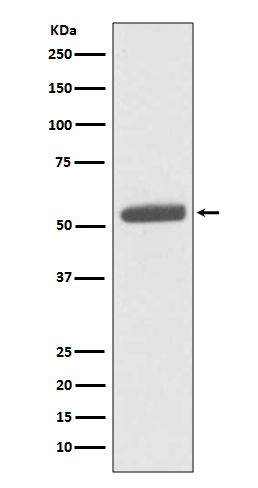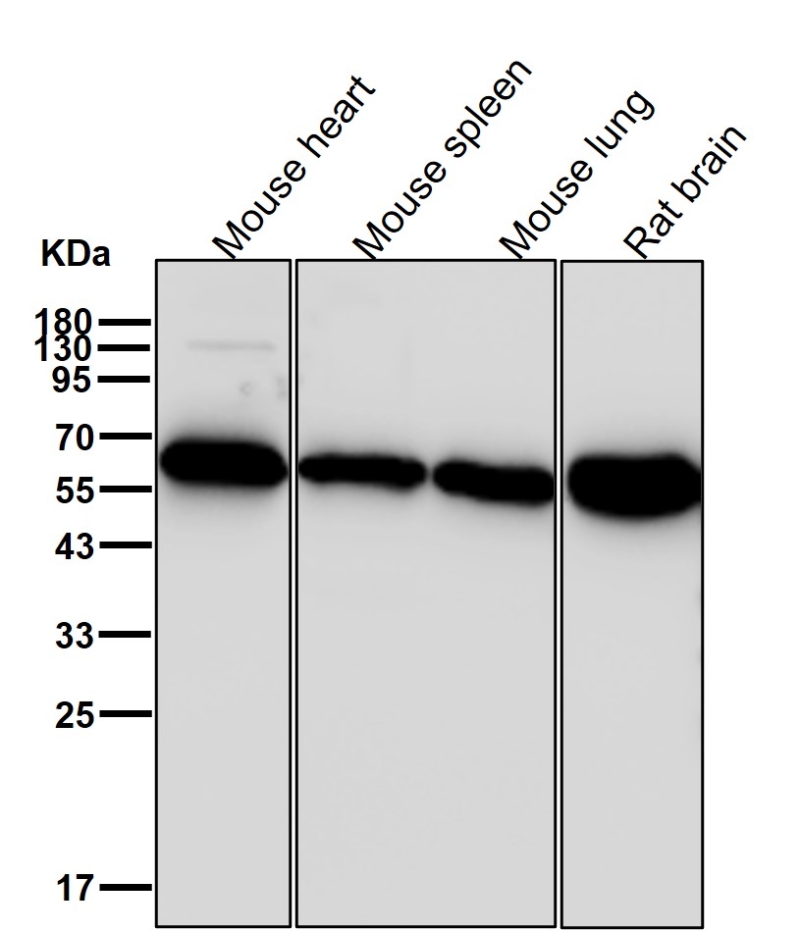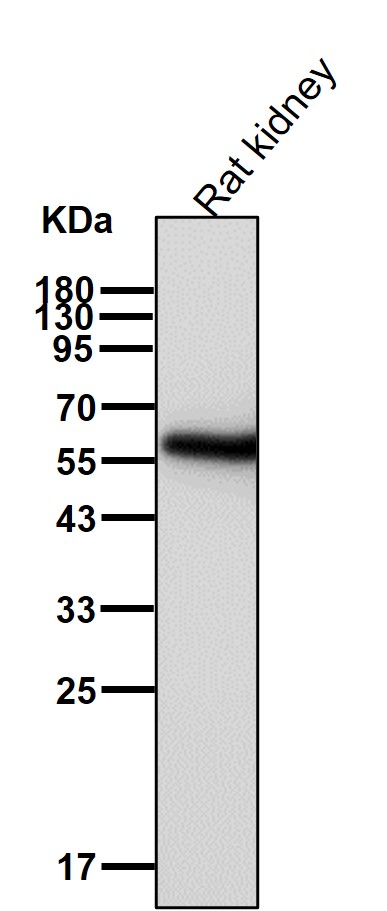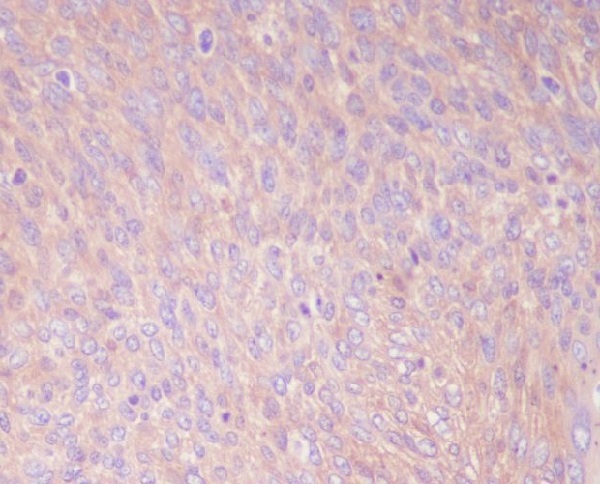



| WB | 1/1000-1/2000 | Human,Mouse,Rat |
| IF | 1/50-1/200 | Human,Mouse,Rat |
| IHC | IHC:1/100-1/200;IHF:1/50-1/200 | Human,Mouse,Rat |
| ICC | 1/50-1/200 | Human,Mouse,Rat |
| FCM | 1/20-1/100 | Human,Mouse,Rat |
| Elisa | 咨询技术 | Human,Mouse,Rat |
| Aliases | CTHBP; Cytosolic thyroid hormone binding protein; KPYM; OIP 3; Oip3; OIP3; OPA interacting protein 3; p58; PK Muscle type; muscle type; PK2; Pk3; PKM2;PKM |
| WB Predicted band size | 58 kDa |
| Host/Isotype | Rabbit IgG |
| Antibody Type | Primary antibody |
| Storage | Store at 4°C short term. Aliquot and store at -20°C long term. Avoid freeze/thaw cycles. |
| Species Reactivity | Human,Mouse,Rat |
| Immunogen | A synthesized peptide derived from human PKM |
| Formulation | Purified antibody in PBS with 0.05% sodium azide,0.05% BSA and 50% glycerol. |
+ +
Western blot analysis of PKM2 expression in HeLa cell lysate.
All lanes use the Antibody at 1:2K dilution for 1 hour at room temperature.
All lanes use the Antibody at 1:2K dilution for 1 hour at room temperature.
Immunohistochemical analysis of paraffin-embedded human cervix cancer, using PKM2 Antibody.
以下是3篇关于PKM2抗体的经典文献摘要概括:
1. **文献名称**: *PKM2 Isoform-Specific Deletion Reveals a Differential Requirement for Pyruvate Kinase in Tumor Cells*
**作者**: Israelsen, W.J., et al.
**摘要**: 该研究利用PKM2特异性抗体验证基因敲除模型,证明PKM2在肿瘤细胞代谢重编程中的关键作用,尤其在Warburg效应和细胞增殖中不可或缺。
2. **文献名称**: *Tyrosine Phosphorylation Inhibits PKM2 to Promote the Warburg Effect and Tumor Growth*
**作者**: Hitosugi, T., et al.
**摘要**: 通过PKM2抗体检测磷酸化修饰,揭示酪氨酸磷酸化抑制PKM2酶活性,促进肿瘤细胞糖酵解和生长,为靶向PKM2的癌症治疗提供依据。
3. **文献名称**: *PKM2 Regulates the Warburg Effect and Promotes Tumorigenesis*
**作者**: Christofk, H.R., et al.
**摘要**: 研究使用PKM2特异性抗体证实其表达与肿瘤发生相关,PKM2通过调控糖酵解通量促进肿瘤细胞增殖,并影响基因表达和氧化应激反应。
这些文献均通过PKM2抗体进行蛋白检测或功能研究,聚焦其在肿瘤代谢中的调控机制。
PKM2 (pyruvate kinase M2) is a key isoform of the pyruvate kinase enzyme family, which catalyzes the final step of glycolysis by converting phosphoenolpyruvate to pyruvate while generating ATP. Unlike other isoforms, PKM2 is preferentially expressed in rapidly proliferating cells, including cancer cells, where it plays a dual role in regulating metabolic reprogramming and gene transcription. Its unique ability to switch between a highly active tetrameric form (promoting oxidative metabolism) and a less active dimeric form (redirecting glycolytic intermediates to biosynthetic pathways) underpins the Warburg effect, a hallmark of cancer metabolism. PKM2 is also involved in non-metabolic functions, such as acting as a protein kinase or transcriptional coactivator, influencing cell cycle progression, apoptosis, and tumorigenesis.
PKM2 antibodies are essential tools for studying its expression, localization, and post-translational modifications in both normal and pathological contexts. They are widely used in techniques like Western blotting, immunohistochemistry, and immunofluorescence to investigate PKM2's role in cancer progression, metabolic disorders, and therapeutic targeting. Elevated PKM2 levels are correlated with poor prognosis in various cancers, making it a potential biomarker and therapeutic target. Researchers also utilize these antibodies to explore PKM2's interaction with oncogenic signaling pathways (e.g., HIF-1α, mTOR) and its regulation by metabolites or phosphorylation. Developing specific PKM2 antibodies remains critical for dissecting its complex roles in health and disease.
×